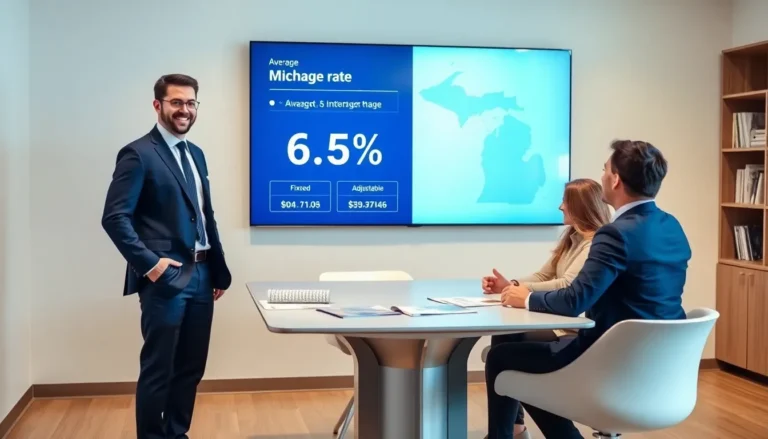Navigating the world of mortgages can feel like trying to solve a Rubik’s Cube while blindfolded, frustrating and confusing. But fear not, because understanding PNC mortgage rates doesn’t have to be a challenging job. Whether you’re a first-time homebuyer or a seasoned pro looking to refinance, PNC offers a variety of mortgage products to meet your needs. In this text, we’ll unravel the mysteries behind mortgage rates, explore the unique factors that influence PNC’s rates, and equip you with all the information necessary to make an well-informed choice. So, grab your favorite beverage and let’s jump into the nitty-gritty.
Understanding Mortgage Rates

Mortgage rates can often feel like that unpredictable neighbor, subject to sudden changes and completely mysterious. At their core, mortgage rates represent the cost of borrowing money from a lender to purchase or refinance a home. They can be influenced by various factors, including the economy, the Federal Reserve’s monetary policy, and even the housing market itself.
In general, mortgage rates can be classified as fixed or adjustable. A fixed-rate mortgage keeps the same interest rate throughout the entire term, providing consistency. Conversely, adjustable-rate mortgages may fluctuate, often starting with a lower interest rate that adjusts after a predefined period, think of it as a roller coaster that you can’t quite predict.
Understanding how these rates work is crucial to getting the best deal for your home financing.
Factors Influencing PNC Mortgage Rates
Several elements come into play when determining PNC mortgage rates. One of the most significant factors is the overall economic environment. Interest rates set by the Federal Reserve can heavily impact mortgage rates. When the economy is booming, expect higher rates, while slower economic times often lead to lower rates.
Another important factor is the borrower’s credit score. Individuals with higher credit scores are generally seen as less risky, which can result in better mortgage rates. Also, the Down payment amount influences rates: larger initial payments often lead to lower interest rates, akin to giving lenders a warm and fuzzy feeling.
Finally, the term of the loan matters significantly. Shorter loans, like 15-year mortgages, typically come with lower rates than longer loans. It’s all about balancing risk and reward for mortgage lenders.
Types of Mortgage Products Offered by PNC
PNC offers a variety of mortgage products tailored to meet different financial needs. Their options often include:
Fixed-Rate Mortgages
These provide consistent monthly payments over the life of the loan, making budgeting simpler.
Adjustable-Rate Mortgages (ARMs)
These start with lower initial rates but can adjust after set periods, offering potential savings upfront, but with a little risk.
FHA Loans
For those who may find it challenging to save for a hefty down payment, FHA loans allow for lower down payments and are backed by the Federal Housing Administration.
VA Loans
Exclusively designed for veterans and active-duty military personnel, VA loans offer competitive rates without the need for a down payment.
By presenting these various options, PNC aims to cater to diverse customer profiles, making homeownership accessible.
How to Apply for a PNC Mortgage
Applying for a mortgage with PNC can be a streamlined process when broken down into manageable steps:
- Pre-qualification: Start by providing your financial information to get an idea of how much you can afford.
- Pre-approval: After pre-qualification, submit a formal application. PNC will review your financials and credit history to establish a loan amount you’re approved for.
- Loan Process: Once pre-approved, gather necessary documentation, such as income verification and asset statements. This phase involves underwriting, where the lender evaluates your creditworthiness.
- Closing: After approval, you’ll attend the closing meeting to finalize your mortgage details, sign numerous documents, and get the keys to your new home.
By following these steps, the application process can be smooth and less intimidating.
Comparing PNC Mortgage Rates with Competitors
Comparing PNC mortgage rates with those from competitors can be insightful. Generally, lenders like Quicken Loans, Wells Fargo, and others provide various options, but rates can differ based on individual circumstances.
PNC stands out by offering personalized decisions based on unique financial situations, which can result in competitive rates.
It’s always wise to shop around. Check current rates, consider potential fees, and evaluate the quality of customer service. Online calculators can assist with comparing total costs and monthly payments. Eventually, choosing the right lender is about finding the balance between favorable rates and supportive guidance.
Customer Experience and Reviews
Customer experience can significantly impact the perception of mortgage services. PNC has received relatively positive feedback for its customer support and user-friendly application process. Many customers applaud its streamlined online platform, which simplifies tracking loan progress.
But, like any organization, there are mixed reviews. Some users have expressed frustrations about delays or communication issues, but these tend to be exceptions rather than rules. Overall, a broad range of customer experiences can provide valuable insights. Seek out reviews on reputable platforms to gather diverse opinions before making a final decision.






